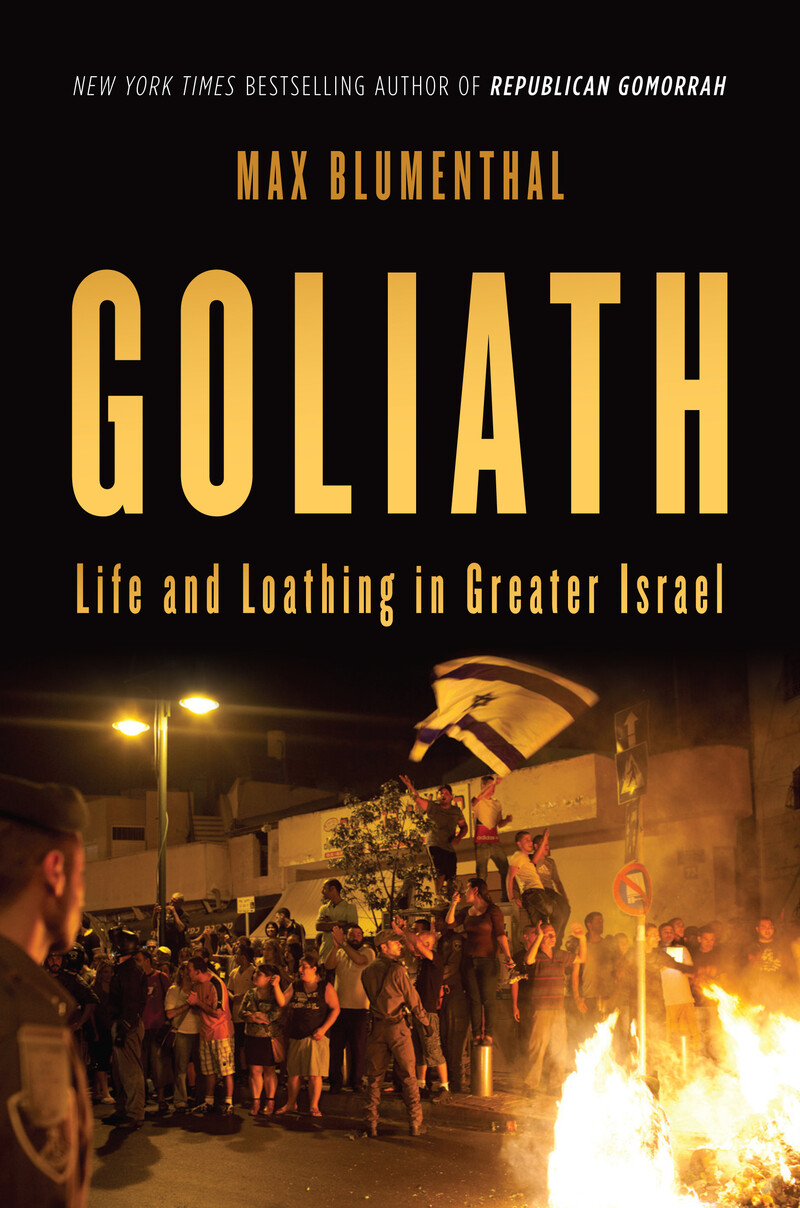The Electronic Intifada 4 November 2013

A specter is haunting Israel; it’s the specter of democracy. In Goliath: Life and Loathing in Greater Israel, the American journalist Max Blumenthal holds up a mirror to Israeli society and reveals the specter of a failed democracy now hurtling toward fascism.
In 73 chapters and 410 pages, Blumenthal documents the racism that pervades Israeli society and institutions and traces its origins to the Zionist movement’s settler-colonial project to create an ethnocratic state bent on excluding and dispossessing the indigenous Palestinian population. Others have done this before, but several things make Blumenthal’s book unique.
Based on four years of research, much of it spent in Israel and the occupied West Bank, Goliath may be the most comprehensive survey yet of contemporary Israeli society and politics. At the same time its ability to link the past to the present shows a continuum of racism and authoritarianism throughout Israel’s history.
Unlike some critiques that focus mainly, if not exclusively, on the 1967 occupation of the West Bank and Gaza Strip, Blumenthal confronts the Nakba — the forced displacement of Palestinians before Israel’s establishment in 1948 — to illustrate liberal Zionism’s hypocrisy. He excoriates its embrace of the two-state solution as a means of preserving Jewish supremacy and avoiding the “demographic nightmare” of Palestinian babies.
Moreover, Blumenthal provides a profile of Palestinian activists and legislators and an emerging anti-Zionist, Jewish Israeli left that is rarely, if ever, found in the mainstream corporate media.
“Military-media complex”
Blumenthal tells his story in vignettes that detail just how openly racist Israel has become. These stories underscore the ongoing dispossession of Palestinians not just in the West Bank and Gaza but also within Israel itself. They also show the growing popularity of the far right with its hate-mongering rhetoric aimed not just at Palestinians but also asylum-seeking Africans.
Blumenthal examines the raft of new laws passed by Israel’s parliament, the Knesset, that widen the discriminatory gap between Jews and Palestinians while attempting to obliterate Palestinian identity and repress dissent.
Meanwhile, he coins the phrase “military-media complex” to ridicule journalists who faithfully parrot the misinformation transmitted by the Israeli army in an attempt to portray Palestinian resistance as terrorism. This phenomenon was particularly evident in the Israeli media’s coverage of the Mavi Marmara massacre.
Among the other topics he examines are the growth of street and mob violence aimed at Palestinians and African refugees, including the remarkable similarities between Israel today and the Deep South of the United States in the 1940s and 1950s; the role of the education system and school textbooks in perpetuating racist stereotypes of Palestinians and burying the history of 1948; and the strengthening ties between Israel’s far-right religious zealots and the military.
The vignettes go on and on, and the cumulative impact is devastating.
What emerges is a portrait of an Israeli political spectrum that runs the gamut not from left to right but from center-right to far-right, in which talk of the forcible transfer of Palestinians from within Israel and the West Bank is openly heard.
Chilling
In the opening chapters Blumenthal relates his interviews with some of Israel’s far-right politicians as they endorse anti-democratic measures aimed at the Palestinian minority. By the end of the book, the reader is treated with the chilling news that many of those same figures or their counterparts now occupy ministerial positions within the coalition government formed earlier this year.
With the rightward tilt of Israeli society, Blumenthal notes that even the liberal Zionist Labor Party is attempting to shed any links to left-wing politics. This should probably not come as a surprise.
As the political historian Zeev Sternhell and others have pointed out, the roots of labor Zionism display a greater affinity with what he termed “nationalist socialism” than Marxist socialism. The Israeli anti-Zionist left, which is almost as reviled in some Israeli circles as the Palestinians, would be identified in any other country simply as a democratic, anti-racist, anti-authoritarian left. Blumenthal makes clear that it is a small and embattled group of people that still enjoys a measure of Jewish privilege but is increasingly targeted and prevented from holding protests.
Blumenthal, an Electronic Intifada contributor, is an engaging journalist who has a knack for letting people talk and expose themselves. He has the ability to be both objective and empathetic at the same time, and he leaves no doubt about where he stands.
Logic of racism
His previous book, Republican Gomorrah: Inside the Movement that Shattered the Party, details the rise of the Christian right within the Republican Party and earned him a lot of media attention, including book reviews and TV appearances. Needless to say, Goliath has not received similar treatment.
Instead, a book review editor for The Wall Street Journal boasted that he threw his copy in the trash, and there have been no appearances on MSNBC or NPR. Even though Goliath was published by Nation Books, an adjunct of The Nation magazine, the editors of The Nation chose to give an excerpt from the book equal billing with a misleading review by Eric Alterman, the magazine’s media columnist who is a liberal Zionist.
Much has been written elsewhere about Alterman’s many distortions of the book and his hysterical tone. What captured my attention was his objection to Blumenthal’s reporting on the fascist trend within Israel and the titling of certain chapters, such as “The Concentration Camp” and “The Night of Broken Glass,” because they evoke the Nazis.
Never mind that Blumenthal merely quotes Israelis who believe the country is becoming fascist, including those who have emigrated because of it. And never mind that the chapter titles are particularly apt, especially after one reads their content. There is a larger point here. As Martin Luther King, Jr once observed, “The ultimate logic of racism is genocide.”
The logic of political Zionism resulted in a politicide — an attempt to eliminate a people’s national identity and existence. To accomplish that, the Zionist movement attempted to eliminate Palestinians’ rights as human beings.
If Palestinians resist this politicide, Zionism answers by denying them the right to live, even if they protest nonviolently. Mob violence directed at Palestinian and African-owned shops within Israel does not resemble the same historical circumstances that resulted in Kristallnacht in Germany under the Nazis. But the seed — the quest for ethnic purity — is the same seed that once planted takes root in fascist soil.
Rod Such is a freelance writer and former editor for World Book and Encarta encyclopedias. He is a member of the Seattle Mideast Awareness Campaign and Americans United for Palestinian Human Rights.






Comments
THE EXPLORATION OF PAIN, NO ANESTHETIC !!!
Permalink Peter Loeb replied on
I have so little money. All of last month I went without. No restaurants, not much
at the drugstore fewer and fewer neccessities (I was down to only one bar of
soap!). "Saving" is not a real possibility on only 80 dollars per month.
After the review in EI, I bought Max Blumenthal's GOLIATH....I "knew"it in my
heart. It was always the source of my passion. Reading it is like tearing away
the skin bit by bit and exposing the horror and the pain.--- Peter Loeb,Boston MA USA
Goliath
Permalink Larry Snider replied on
I just started to read Goliath after reading a bunch of media reviews that go from one extreme to the other. I have studied the conflict every day for the past 14 years and read everything from Caroline Glick and the Conference of Presidents to Ali Abunimah and Mondoweiss. That it itself doesn't determine whether I can bring any special insight to this ongoing tragedy. As for Goliath so far, (and I just started), it is well written but a narrow one sided account of Zionism at its worst with plenty of carefully chosen examples, (vignettes), to underline flaws both large and small in bold and assuredly sans any contrary information.